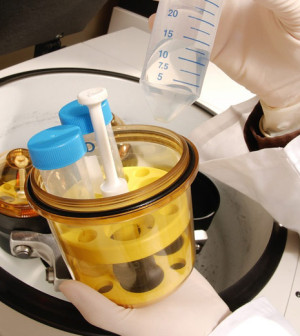- Could Your Grocery Store Meat Be Causing Recurring UTIs?
- Are You Making This Expensive Thermostat Error This Winter?
- Recognizing the Signs of Hypothyroidism
- 10 Strategies to Overcome Insomnia
- Could Artificial Sweeteners Be Aging the Brain Faster?
- Techniques for Soothing Your Nervous System
- Does the Water in Your House Smell Funny? Here’s Why
- Can a Daily Dose of Apple Cider Vinegar Actually Aid Weight Loss?
- 6 Health Beverages That Can Actually Spike Your Blood Sugar
- Treatment Options for Social Anxiety Disorder
Scans May Spare Some Hodgkin Lymphoma Patients From Chemo

A certain type of medical scan can be used to help spare some Hodgkin lymphoma patients from the severe side effects of chemotherapy, a new study suggests.
Researchers found that PET imaging can identify patients whose Hodgkin lymphoma will likely respond better to treatment, and therefore require less intensive chemotherapy.
“The good news is that the majority of people diagnosed with Hodgkin lymphoma can be cured — in this trial more than 95 percent of patients are alive after three years. But we worry about the long-term side effects from the treatments we use,” study leader Peter Johnson, a professor of medical oncology at the University of Southampton in England, said in a university news release.
“As we’ve done in this trial, personalizing treatment based on how well it works is a major development for patients with Hodgkin lymphoma, and sets a new standard of care,” he noted.
PET scans were given to more than 1,200 patients with advanced Hodgkin lymphoma who had undergone two cycles of standard chemotherapy. Those with a clear scan continued chemotherapy without the drug bleomycin. Those who didn’t have a clear scan — suggesting a more resistant form of the blood cancer — continued chemotherapy with bleomycin.
Bleomycin has been used to treat Hodgkin lymphoma for 30 years, researchers said. But, the drug can lead to scarring of the lungs that can cause serious breathing problems.
Patients with clear PET scans who stopped receiving bleomycin had the same survival rate as those who continued receiving the drug, according to the study.
“Knowing which patients have a more difficult-to-treat form of the disease means we can select those who need stronger chemotherapy, while sparing everyone else the severe side effects such as infertility,” Johnson said.
“This approach, along with a reduction in the need for radiotherapy, should substantially reduce damage to healthy tissues and the risk of second cancers caused by treatments,” he added.
The study was published in the June 22 issue of the New England Journal of Medicine.
More information
Lymphoma Canada has more about Hodgkin lymphoma.
Source: HealthDay
Copyright © 2026 HealthDay. All rights reserved.










